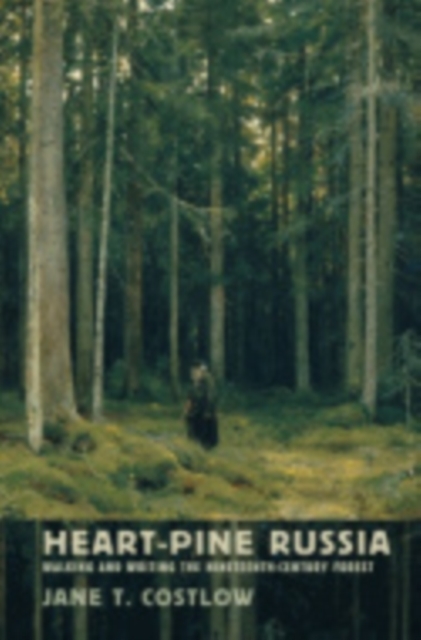Heart-Pine Russia: Walking and Writing the Nineteenth-Century Forest

Heart-Pine Russia: Walking and Writing the Nineteenth-Century Forest
Russia has more woodlands than any other country in the world, and its forests have loomed large in Russian culture and history. Historical site of protection from invaders but also from state authority, by the nineteenth century Russia's forests became the focus of both scientific scrutiny and poetic imaginations. The forest was imagined as alternately endless and eternal or alarmingly vulnerable in a rapidly modernizing Russia. For some the forest constituted an imaginary geography of religious homeland; for others it was the locus of peasant culture and local knowledge; for all Russians it was the provider of both material and symbolic resources. In Heart-Pine Russia, Jane T. Costlow explores the central place the forest came to hold in a century of intense seeking for articulations of national and spiritual identity.Costlow focuses on writers, painters, and scientists who went to Russia's European forests to observe, to listen, and to create; increasingly aware of the extent to which woodlands were threatened, much of their work was imbued with a sense of impending loss. Costlow's sweep includes canonic literary figures and blockbuster writers whose romances of epic woodlands nourished fin-de-siècle opera and painting.Considering the work of Turgenev, Tolstoy, and Korolenko in the company of scientific foresters and visual artists from Shishkin and Repin to Nesterov, Costlow uncovers a rich and nuanced cultural landscape in which the forest is a natural and national resource, both material and spiritual. A chapter on the essays and aesthetic of Dmitrii Kaigorodov, a forester and natural historian who wrote for a broad public at the very end of the imperial era, suggests a distinctive Russian environmental ethic nurtured by the rich array of texts and images that Costlow explores. The relationship between humankind and the natural world that these works portray is complex and shifting. Visionary and skeptic, optimist and pessimist: all turn to the northern forest as they plumb what it means to be Russian.
PRP: 291.09 Lei
Acesta este Prețul Recomandat de Producător. Prețul de vânzare al produsului este afișat mai jos.
232.87Lei
232.87Lei
291.09 LeiLivrare in 2-4 saptamani
Descrierea produsului
Russia has more woodlands than any other country in the world, and its forests have loomed large in Russian culture and history. Historical site of protection from invaders but also from state authority, by the nineteenth century Russia's forests became the focus of both scientific scrutiny and poetic imaginations. The forest was imagined as alternately endless and eternal or alarmingly vulnerable in a rapidly modernizing Russia. For some the forest constituted an imaginary geography of religious homeland; for others it was the locus of peasant culture and local knowledge; for all Russians it was the provider of both material and symbolic resources. In Heart-Pine Russia, Jane T. Costlow explores the central place the forest came to hold in a century of intense seeking for articulations of national and spiritual identity.Costlow focuses on writers, painters, and scientists who went to Russia's European forests to observe, to listen, and to create; increasingly aware of the extent to which woodlands were threatened, much of their work was imbued with a sense of impending loss. Costlow's sweep includes canonic literary figures and blockbuster writers whose romances of epic woodlands nourished fin-de-siècle opera and painting.Considering the work of Turgenev, Tolstoy, and Korolenko in the company of scientific foresters and visual artists from Shishkin and Repin to Nesterov, Costlow uncovers a rich and nuanced cultural landscape in which the forest is a natural and national resource, both material and spiritual. A chapter on the essays and aesthetic of Dmitrii Kaigorodov, a forester and natural historian who wrote for a broad public at the very end of the imperial era, suggests a distinctive Russian environmental ethic nurtured by the rich array of texts and images that Costlow explores. The relationship between humankind and the natural world that these works portray is complex and shifting. Visionary and skeptic, optimist and pessimist: all turn to the northern forest as they plumb what it means to be Russian.
Detaliile produsului









